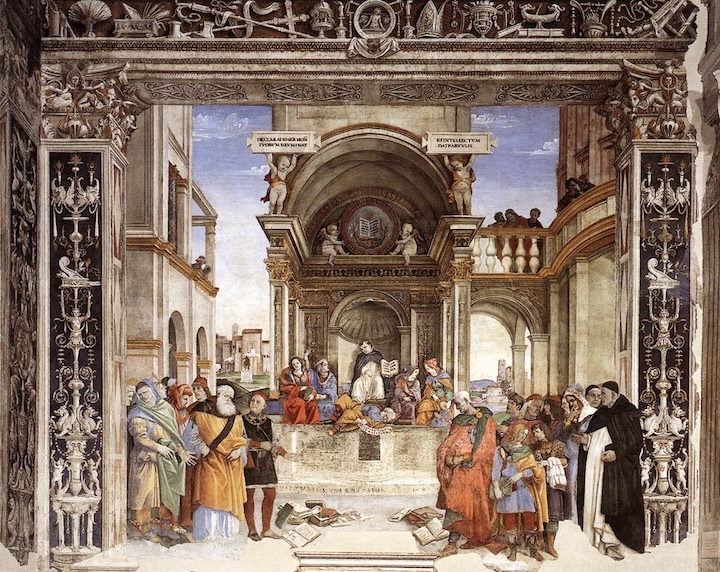Has the pope opened the door for same-sex blessings?
He can’t, for to do so wouldn’t be Catholic. The same comment could be made for any number of issues, that might or might not be discussed, at the “Synod on Synodality” that is now upon us.
For the Catholic Catechism has been clear, and was made clear again in the language of Trent, and in that of only a generation ago. Even to discuss such matters as open questions is to carry us into uncharted territory, i.e. territory discreetly avoided in the past.
The Church is not a debating society. Perhaps this remark has been made already, by others. But I repeat it because it is dead obvious.
We may discuss some aspect of the Faith which is not understood, because it is so deep that we have not reached the bottom. We may seek light and clarity where there are souls who seek sincerely – the truth that is always there.
But the desire to change Church teaching, and hence Church “policy,” means proposing an insincere inquiry. And this is exactly, and unambiguously, what is proposed at the present day.
To say that Christian marriage is in contradiction to same-sex unions is to miss the point. It is like the old argumentative device that invented “heterosexuals,” as a term to define persons not “homosexual”; or more recently “cisgender” to be the opposite of “trans-gender.”
It is the creation of a new named perversity that can apply to the absence of a perversity.
This will of course be received as a hard saying, but nothing in it implies uncharity. For deviation from a norm is not essentially illicit. (Specific deviations are.) The suggestion that a normal person suffers from a special condition is trivial, or it is a smear.
We cannot easily predict what other matters may be suddenly raised in this revolutionary Synod. That a secret agenda is in operation, we may, however, confidently infer. And we must prepare to be disturbed by it.
The “dubia” on five key points of the Synod, submitted on July 10, and then re-submitted, more stringently worded, on August 21, sought a Yes or No in reply to real questions. It received only vague and elusive replies, in the first case, and no reply at all in the second. This should have been alarming.
As previously, when Cardinals such as Burke, Brandmüller, Sarah, Zen, Íñiguez, have asked for clarity, they have been given silence, or a run-around. This, in itself, regardless of topic, is not how the Catholic Church does things. It was previously possible to get a plain answer to a plain question.
Perhaps it is coincidence, or perhaps there is a murkier mystery, that the world seems to have dissolved into faithlessness of many different kinds in the past ten years. For this decade does not just correspond to the reign of Pope Francis. The Internet of social media also exploded about the year 2013, creating new political conditions around the globe.

For a Catholic, the difficulty of distinguishing one revolution from another must be candidly acknowledged. We are dealing with events that are as “post-rational” in spirit as the gender-bending that marks our material environment.
Even if the papacy were in good and reliable hands, we would be going through chaos now. In the background of modernity, the confusion had anyway reached a point of fission.
Pope Benedict XVI was vividly aware that this was the case. He expected appalling things to befall the Church, no matter which personalities would be put in charge. His efforts, including those designed to bring peace to the liturgical “war” that had been brewing just under the surface, since Vatican II, were an attempt to address this chaos.
Benedict was “obsessed” with the need to name God explicitly; to bring the actual Christ back into popular circulation, wherever possible. He was trying to defeat the contrary obsession with what I would call our “interior decoration.”
But the pope who wrote Laudate Deum, as a sequel to his encyclical Laudato Si’, has other priorities. The most recent Franciscan document hardly mentions God, but goes into battle against men and women who deny the severity of the threat posed by climate change.
It is the purposeful elusiveness, as much as the flirtation with novelty and heresy, that moves intelligent, faithful Catholics towards despair. What can we do with a magisterium like this?
Curiously, a kind of solution appears in the Catena Aurea. This marvelous anthology, or “Golden Chain,” brings together some eighty of the Greek and Latin Fathers of the Church, in one continuous series – ordered by the Gospel texts to which they refer.
The work was a brilliant commission by Pope Urban IV, in the XIIIth century. It was compiled by Thomas Aquinas, working from the quarters of the Dominican studium in Rome.
The commentary is wonderfully accessible, yet there should be no surprise, for neither Saint Thomas nor the Church Fathers he edited wrote elusively, or used the technical jargon to which professional philosophers (and theologians) are prone.
John Henry Newman translated the work into fine English, and the British publisher Baronius is the most recent to make it generally available, handsomely typeset and bound.
Rather than following the Synod, one could be following that.
For here is the true synod of synods, from the first centuries. As a converted Protestant, I am myself amused that it is the most articulate and reliable presentation of what we might call “Bible Christianity.”
The Fathers presented everything relevant they knew, in their Biblical commentaries. It has been a principle of the Church that no one should interpret Scripture in contradiction to the unanimous consent of the Fathers; and in the Catena Aurea, we can read what that was.
What the Church needs is not more reckless experiment. What the Church needs instead, is a humble return to source.
__________















